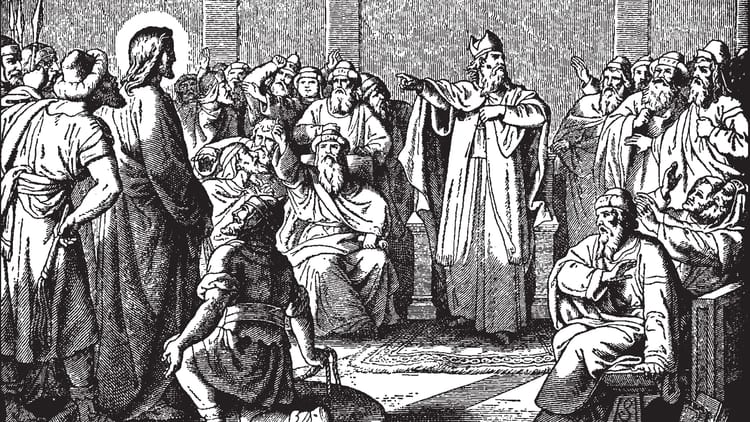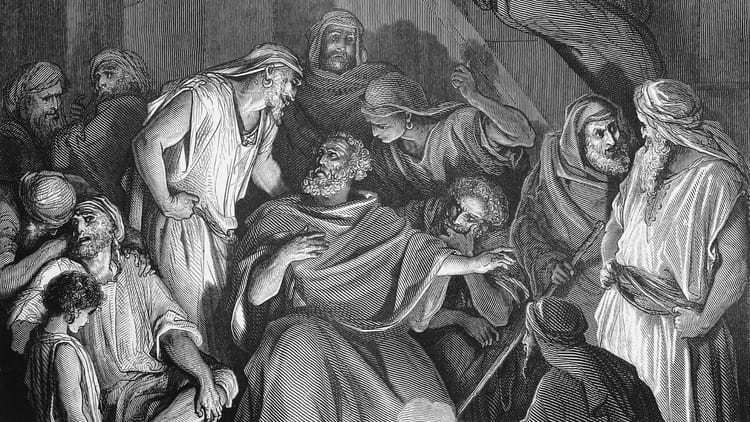I AM in the Storm (Mark 6:45-56)

This Fall, we’ve been studying the Gospel of Mark, which is the earliest account of Jesus’ life and ministry. Today we come to a passage of Scripture that has a lot to say to us. If you relate to this, this passage will rebuke you and give you hope. At least that’s what it did for me.
In this passage we learn something about our situation, something about Jesus, and then we face a test. It’s important that we pay attention to what this passage teaches us, because if we pass this test we’ll be prepared to deal with anything that comes our way.
So let’s look at what this passage teaches us about us and our situation.
Jesus has just fed five thousand men, as well as additional women and children, with five small loaves of bread and two fish. In verse 45 we read, “Immediately Jesus made his disciples get into the boat and go on ahead of him to Bethsaida, while he dismissed the crowd.” Jesus acts with urgency. He wants the disciples gone, and according to verse 46, he wants to be alone to pray. What’s going on here?
What had just happened – the five thousand – became a test for both Jesus and for the disciples.
For Jesus, the test was one that we usually don’t recognize as a test. We read in the Gospel of John that the crowd that Jesus fed was ready to force him to become King. Jesus was so popular at that point that he faced the temptation to get sidetracked from his mission due to the acclaim of the crowds. Jesus also knew that the path ahead led to the cross, not to glory and conquest. The glory and victory would come, but not before betrayal and death. So Jesus was going through his own storm, and so he retreated and spent most of the night in prayer.
But the focus in this passage really isn’t on the storm that Jesus faced. Mark doesn’t even go there. Instead, he draws our attention to what the disciples are going through. We read in verses 47 and 48:
When evening came, the boat was in the middle of the lake, and he was alone on land. He saw the disciples straining at the oars, because the wind was against them. Shortly before dawn he went out to them, walking on the lake.
Now notice this. Jesus has sent the disciples onto the boat alone. If you know these disciples well, you should have the same feeling that you have when the neighbor down the road goes out and leaves the kids at home alone. You know it’s not going to be a good situation. Almost every time these disciples are away from Jesus, they encounter some kind of problem.
But then notice what Jesus had sent them into. This wasn’t like the storm they had already faced in which their lives were in danger. This was more like a wind that wouldn’t let up. We read that they are straining at the oars and making very limited progress. By the time Jesus does anything about it, it’s between three and six in the morning. It seems that he doesn’t even respond right away.
One commentator says:
This episode is a good illustration of the life of discipleship… It was not through stubborn self-will, but through direct obedience to the Lord’s command, that the disciples found themselves in this plight. Thus the storm in now way showed that they had deviated from the path of God’s will: God’s path for them lay through the storm, to the other shore of the lake. Moreover, it appeared as if the Lord had forgotten them; they were alone, at night, making heavy weather with the rowing. (R. Alan Cole)
Ask yourself: Why would Jesus allow the disciples to go through this crisis alone? The answer has to be that this is part of the preparation process that the disciples needed as part of their training. We are going to be placed in situations, believing that God has sent us. We are going to be straining at the oars making very little progress at all. It’s going to seem as if we’re alone and that Jesus is off somewhere else. We can expect this to be part of our experience.
There really are three lessons we’re expected to learn:
We will face adversity and hardship. Following Christ does not mean an exemption from suffering. Following Christ will sometimes lead us directly into a position of suffering and hardship. We should not be surprised to encounter times of suffering. When we follow Jesus, adversity and hardship will be part of the path.
There are going to be times when we’re at the end of our own resources. The picture of the disciples “straining at the oars” is a good one for us. There are going to be times that we are working very hard but seemingly making very little progress. Reaching the point of helplessness and desperation is actually a step forward spiritually.
There will be times that Jesus seems absent. We will be in the storm and it will seem like God has abandoned us.
If you are in one of these moments right now of suffering and hardship, of being at the end of your resources, feeling that God is perhaps absent, then you are in a very good spot. As Eugene Peterson says:
Suffering is not evidence of God’s absence, but of God’s presence, and it is in our experience of being broken that God does his surest and most characteristic salvation work.
There is a way to accept, embrace, and deal with suffering that results in a better life, not a worse one, and more of the experience of God, not less.
God is working out his salvation in our lives the way he has always worked
We’re going to face situations like this, and it’s in these very situations that we learn something about Jesus.
Well, what does this passage help us learn about Jesus?
As the disciples face this hardship, what does Jesus teach them, and us, about himself?
There are a few details here that point to something deeper going on here. Verse 48 says, “Shortly before dawn he went out to them, walking on the lake. He was about to pass by them…” Throughout the years, people have struggled with the idea of Jesus walking on the water. They should too. We all know that people don’t walk on water. Scripture teaches that treading the water is something that only God can do. Job 9:8 says:
He alone stretches out the heavens
and treads on the waves of the sea.
This is, by the way, the point. Jesus walking on the water reveals that he is more than a teacher or a prophet. Once again we’re forced to ask, “Who in the world is this?”
Then we come to the phrase, “He was about to pass by them…” This seems to make no sense. The disciples are struggling to make progress. Why would Jesus just pass by? Bible scholars have proposed all kinds of theories. To really understand what’s happening, you need to understand what it means to “pass by.”
In Exodus 33, Moses said to God, “Show me your glory.” God replied, “I will cause all my goodness to pass in front of you, and I will proclaim my name, the LORD, in your presence… When my glory passes by, I will put you in a cleft in the rock and cover you with my hand until I have passed by” (Exodus 33:19,22). In 1 Kings, God told Elijah, “Go out and stand on the mountain in the presence of the LORD, for the LORD is about to pass by” (1 Kings 19:11). Jesus is not only walking on water here, which tells us that this is no normal person, but now he’s also passing by. This is the language of God revealing himself. As God revealed himself to Moses at Sinai, and on Horeb to Elijah, God now reveals himself in the person of Jesus Christ to the disciples.
There’s one more clue that we need to spot. When the disciples saw Jesus passing by, walking on the water, they thought he was a ghost. Jesus immediately spoke to them and said – in my translation – “Take courage! It is I. Don’t be afraid.” Jesus said, "Take courage." I am. Don’t be afraid.” Do you know what this means? When Moses asked God for his name when God first revealed himself to Moses, God gave his name as “I AM” (Exodus 3:14). I AM is God’s personal name. It’s how God describes himself. Jesus is saying that the God who created the world from nothing, who set the stars in place, who gave us life, who made a covenant with his people, and who delivered Israel out of Egypt – that great I AM is now walking on the water in the middle of the storm. Jesus passes by them and reveals his presence and identity so that they can have confidence in the storm. The point isn’t that Jesus will rescue them from the storm – although, as we’ll see in a moment, he does that. The point is that I AM is with them in the storm.
When you begin to put this together with the other events that have taken place, you begin to realize what Mark is teaching about Jesus. Can you think of another time that God led his people safely through the waters and fed them in the wilderness when there was no food? During the exodus, when God brought his people out of slavery and into freedom. Mark is saying that Jesus is the new and better Moses bringing his people out of slavery and into freedom. But he’s even better than Moses: he’s the great I AM in person. That who Jesus is, and that is what he’s up to.
Now, let’s just pause here for a moment. We said that this was part of the disciple preparation process. Jesus knew that these disciples were going to face many hardships in the future. Jesus knew that the path for him would lead through many sufferings to the cross. He would be rejected and killed and suffer many terrible things (Mark 8:31). He knew that the path for the disciples would also involve suffering and hardship.
If the point of this passage was that God will deliver us from every hardship, and that he will rescue us from every storm, then we wouldn’t be very well-prepared for what lies ahead. As we’ve already said today, we will face adversity and hardship. There are going to be times that we’re at the end of our own resources, and Jesus seems absent. Every single person here this morning is going to suffer. The point is not that we will be exempt from storms. The point is that the great I AM is with us in the storm. Because he is Lord, we don’t need to be afraid no matter how the sea may rage or the winds blow.
But now, this is what the LORD says–
he who created you, Jacob,
he who formed you, Israel:
“Do not fear, for I have redeemed you;
I have summoned you by name; you are mine.
When you pass through the waters,
I will be with you;
and when you pass through the rivers,
they will not sweep over you.
When you walk through the fire,
you will not be burned;
the flames will not set you ablaze.
For I am the LORD your God,
the Holy One of Israel, your Savior…”
(Isaiah 43:1-3)
God reveals his presence and identity, so we can have confidence in the storm. As C.S. Lewis wrote in The Horse and His Boy, “Aslan was among them though no one had seen him coming.”
We’ve seen that this passage teaches us that we’re going to experience times of hardship in which we’re at the end of our resources, and in which it seems that Jesus is absent. We’ve also seen that this passage reveals that Jesus is the great I AM who assures us of his presence. This passage also does one more thing.
This passage leaves us with a test.
Verses 51 and 52 say, “Then he climbed into the boat with them, and the wind died down. They were completely amazed, for they had not understood about the loaves; their hearts were hardened.”
Mark ties together the feeding of the loaves to Jesus’ revelation of himself as God on the water, and concludes that they had missed something that they should have grasped. They’d witnessed the miracle of the loaves, Jesus walking on water, and many other miracles, but their hearts were hard – a description, by the way, that Mark usually reserves for Peter’s opponents.
It seems that things get delayed. The original destination was Bethsaida, we read in verse 45. They don’t get there for another couple of chapters. And Mark contrasts the hard hearts of the disciples with the crowds in verses 53 to 56 who come to Jesus with faith.
The disciples failed to grasp who Jesus is. They also failed to consider how God had worked in the past, and apply that knowledge to their current situation.
We’re left with the same test. If we understand that God has visited us in the person of Jesus, we can be assured of his presence no matter what we go through. We can have confidence in any storm that we go through.
Let’s pray.
The disciples failed the test. But when Jesus passed through the mother of all storms – when he was betrayed and killed, and when he bore our sins – he passed the test. Because he remained faithful in the storm, there’s hope for all of us who are faithless. “If we are faithless, he remains faithful” (2 Timothy 2:13).
Father, we will go through hardships. May we grasp that Jesus is the great I AM who is present with us in the storm, and may that change us. Soften our hearts. May his presence give us confidence no matter how the sea may rage or the winds blow. In the name of the one who stills storms and multiplies loaves and walks on water, in the name of the great I AM, in the name of the one who died for our sins and who invites us to repent and follow him – in Jesus’ name, we pray. Amen.





